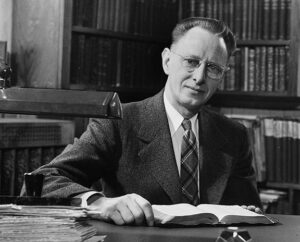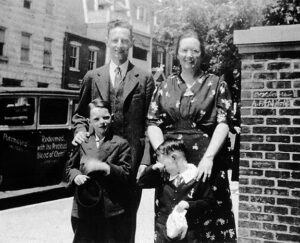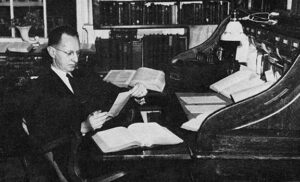Throughout the 2023-24 academic year, Lancaster Bible College | Capital Seminary & Graduate School will celebrate our 90th anniversary! Here, we introduce our community to “90 Faces of LBC” each week. Keep up with all the news and events of our 90th year, read stories and more at lbc.edu/90.
 Henry J. Heydt
Henry J. Heydt
Lancaster Bible College’s Founder & First President
Henry J. Heydt had a stirring in his heart.
Born in Hoboken, N.J., on May 1, 1904, Henry graduated from Moravian College in Bethlehem, Pa., in 1927 and earned his Bachelor of Divinity degree from Moravian Seminary in 1930. While a student, he attended Edgeboro Moravian Church where he met his future wife, Margaret Weeks.
During that time, he also attended Montrose Bible Conference where he posed many questions to Bible Institute students. To Henry, though, it seemed as if the students were simply repeating their lecture points rather than studying theology for themselves. He also disapproved of the liberal theology that had seemingly infiltrated many seminaries and denominations.
Heydt set out to change that by establishing Lancaster School of the Bible in 1933—a place where students would be grounded in orthodox Christian doctrine, immersed in the original languages of the Bible and taught logic in order to strengthen critical thinking.
Mildred (Landis ‘36) Peters, LBC’s 1989 Alumnus of the Year, was drawn to LSB because of her beloved pastor, Henry Heydt.
“I had been saved at an evangelistic meeting and then had a strong desire to study the Word,” Peters shared. “I wanted to go to Moody Bible Institute, but neither my parents nor I had the finances. At that time, Rev. Heydt was teaching the book of Daniel each Sunday afternoon at the Moravian church where he was the pastor. I was so happy to attend these classes, so when Pastor Heydt announced his heeding of God’s call to open a Bible school, I enrolled. I was one of the first. That was the beginning of Lancaster School of the Bible. In my heart, I felt God opened the school for me!”

The Heydt family, clockwise from top left: Henry, Margaret, David and Henry Jr.
Being one of just two females in the first class in 1933, Peters and classmate Helen (Unruh ’36) Kramer helped babysit the Heydts’ sons, Henry Jr. and David (’65). “We, as a student body, were like a family,” recalled Mildred, who also remembers President Heydt inviting missionaries to speak to the students. “The school began by faith; Rev. Heydt had no backing, but looked to the Lord for all needs, including his own, and the Lord did supply!”
Wilbur Martin (’39) was another of the early students to enroll at LSB and credited President Heydt for putting him on the path to his own Bible knowledge and career in ministry. In fact, he was so committed to his studies that he hitchhiked from nearby Ephrata to class and home again. Because he carried a briefcase, “people knew that I was a student, and they were more than willing to pick me up. I walked in all kinds of weather—snow, sleet, rain—but I never had to walk the whole way.”
“I have a very warm spot in my heart for Lancaster School of the Bible,” Martin continued, “because it really helped to direct my life. I never got more Bible than I did at that school in Lancaster. There’s a lot to be said about being grounded in the Word, and for that I have to give Lancaster Bible College the credit. I owe a great deal to LBC and especially to Henry Heydt, because nine-tenths of it I received from him.”
Not surprisingly, the early days of the young college were difficult. In the throes of the Great Depression, funds were low and space was limited, but Heydt succeeded in laying the foundation for the institution of godly higher learning that is LBC today.
“We have a rich heritage as a Bible college,” remarked LBC’s fifth President, Dr. Peter W. Teague. “From its earliest days, LBC has been grounded in the Word of God. The poet Carl Sandburg once said, ‘Nothing happens unless first a dream.’ Ninety years ago, Dr. Henry Heydt, blessed with foresight, had a dream for a new college in Lancaster. He began this godly legacy with his deep reliance upon the Word of God for the direction of the new school. He believed that LSB should remain a ‘biblically grounded and scholastically efficient institution.’”
Teague pointed to a 1951 quote from Heydt as evidence of this: “So much comes to us through the Word that we ought not to live one day without its constant use … Let it be the opening light of your day, and let its beams shine through into every problem that arises, and then permit its sacred pages to encircle you as God’s blanket for warmth of heart and pillow for rest of mind.”
“Truer words were never spoken,” Teague said, “as we celebrate our rich heritage lived out these past 90 years.”

LBC Founder & President Henry J. Heydt worked in his office at Lancaster School of the Bible.
While carrying the significant responsibility of a new Bible college, Heydt simultaneously pastored the Lancaster Tabernacle, which later became Lancaster Gospel Center, from 1933 to 1953. According to writings from his wife, Margaret, there were times the family could not pay the $25 monthly rent for their small home, and with little to no food in the house, Henry often went to class with no breakfast and no lunch, leaning on his lectern by the afternoon because of weakness.
LBC | Capital current President, Dr. Thomas L. Kiedis, often considers the challenges Henry Heydt endured in the early years of the college.
“The year 1933 is considered by some to be the worst of the Great Depression,” Kiedis said. “Yet, President Heydt did not let the difficulties of his circumstances keep him from doing what God called him to do. In the words of Charles Dickens’ ‘A Tale of Two Cities,’ ‘It was the best of times and it was the worst of times.’
“Looking back to LBC | Capital’s beginnings, I like to think, ‘That is our heritage; that is the stock we come from; that is the God we serve,’” Kiedis continued. ”Henry Heydt lived out the kind of resiliency we hope to instill in our students—a resiliency that does not deny the realities of pain, suffering and disappointment in the world, but carries on with hope in the face of them. That is anchored in the truth of Scripture and the certainty of God’s sovereignty. That enables our students to say with confidence, ‘Because the God we serve is the same yesterday, today and forever, we are truly living in the best of times!’”
A Poem by Henry J. Heydt
Is There No God?
Is there no God?
If not, whence came the trees and flowers—
And whence the rain’s refreshing showers?
And I, frail creature of the dust,
From whence came I here on earth’s crust?
Evolved you say?
Ah, then, tell this—from whence the power
That made me out of nothing tower?
Perpetual motion can’t be found,
This must from higher source abound.
Is there no God?
Then why through all the ages down
Is thought of Higher Being found?
In which of tribes beneath the sun
Has this tremendous thought begun?
A myth you say?
And what is myth?—this too must come
From higher source from whence it sprung;
Can finite Infinite conceive
Unless it be from there received?
Is there no God?
Ah look above, whence came the stars—
The heavenly bodies near and far?
Explain the harmony of all,
Can nothing this from nothing call?
By chance you say?
Do ships upon the ocean float
By chance—these grand gigantic boats?
Must there not be some Master Mind
To plan and make all this design?
Is there no God?
But please explain that Man of Men,
The Christ whom God Jehovah sent;
The One to whom all history points,
He who is its essential joint.
Just a teacher?
How were, by prophets long ago,
The details of His life foretold?
And would man die for just a claim
If all he sought were earthly fame?
There is no God?
The fool hath said “There is no God,”
And this he cries until the sod
Looms up before his ghastly face,
And then he pleads to God for grace.
There is a God!
And all the power and might there be
Cannot take this belief from me;
Both now and when I reach your shore
I’ll praise my God forever more!
Special thanks to the late Dr. Thomas O. Figart, who wrote the “Godly Heritage” section of “Stones of Remembrance,” a historical account of Lancaster Bible College written in 2008 to celebrate the college’s 75th anniversary. Read the entire publication at lbc.edu/90.